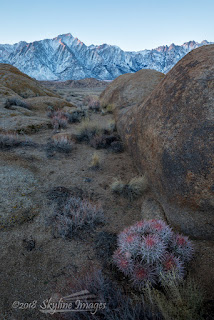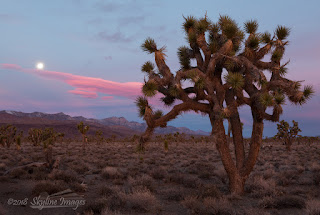 |
| Barrel cactus and alpine glow, Alabama Hills California |
Picture this; I’m out in short-wheelbase 4WD vehicles with my
jeeper friends. We stopped to remodel an
eroded section of the road by moving rocks into the ditch and the first couple
of vehicles made it OK. I thought I was going
to make it too but I got stuck, resting on the front bumper with no traction
and now I’m struggling with the hi-lift jack.
Not so much.
 |
| "Lurch" at sunrise, Death Valley National Park |
I love to get out to remote places, but for me it’s more
about the destination. I blogged
a bit about this a few years ago.
Part of the reason is that my camper-adorned 4WD Tundra is reasonably
capable, but has a long-ish wheelbase. Maybe more to the point, I don’t want to
beat the crap out of it, nor do I enjoy “recovery.” I’ve got gear to get me out of trouble but
would rather not have to use it. All of
this is a trade-off, of course. The up-side
is that when I arrive, I have heat, a fridge, a comfy bed, and a
workspace.
I’ll bet I’m not the only one who feels this way.
This year, my husband and I set out on our nearly-annual
solstice trip to the Mojave Desert. Our
intention was to overland Death Valley, avoiding campgrounds. It was just as well, since the government
shut-down hit early in our trip, so the big campgrounds weren’t available
anyway. By the way the larger Death
Valley CGs are really just glorified parking lots; OK in a pinch or for the
sake of proximity to things I want to photograph but best avoided if there’s an
option.
So, overlanding is a camping trip which typically involves
taking your rig far from civilization and living off the grid for multiple days.
We find we can eat fabulously with what our fridge holds for at least a week
and be well-supplied with water and propane as well.
The fewer people around, the better. I’m pleased with the way that worked out on
this trip; I think that the closest humans to us those first four nights were
ten miles away. Two of those camps were
in completely new places for us and required driving what one of the DV guide
books called roads “with character.”
 |
| Moody pre-dawn moon set, Saline Valley Dunes |
There were two nights at dune fields, and the opportunity to
take advantage of the full moon. Saline
Valley dunes were new to us and a delightful discovery. We used different roads
in and out of the Saline Valley, but both had icy patches. That’s not what most people imagine when they
think of Death Valley.
 |
| Striped Butte, Butte Valley |
I’d been wanting to see Striped Butte in the
southern part of the park for years. It
was a thrill to finally get there, but the road tested our patience. It was about 24 miles and the last half
we averaged about 5 MPH. Like a lot of
places in DV, there are interesting remnants of mines, and in Butte Valley
there’s an impeccably maintained “Geologist’s Cabin” that people stock with
food, books, and games and stay in from time to time. It was tempting, but there’s nothing like sleeping
in my own (mobile) bed.
 |
| Moon riding the "Sierra Wave," Lee Flat |
One night we planned to head to the mouth of Marble canyon
but changed that plan up when beautiful clouds began to develop. We headed for Lee Flat, with its open sky and
dense healthy growth of Joshua Trees, and were rewarded with the setting full
moon and pink-illuminated lenticular clouds at sunrise. A few years ago I
was there in a snowstorm but this was just as beautiful.
 |
| Last glow, Alabama Hills |
After Death Valley we checked back in with civilization and
staked out a spot at the Alabama Hills.
I’ve got several nice conventional shots from this trip, but my favorite
is the glow behind the Sierra. This spot
rarely produces spectacular sunsets, since the 14,000-foot Sierra Nevada Range
is rather close to camp to the west. This night's light was a welcome surprise. Incidentally sunrise is often lovely, though in the
summer months the early light is blocked somewhat by the White Mountains to the
east. The closer to solstice, the better
the sunrise.
All this, lots of unpaved roads, and we never broke out the
recovery gear. Truly a trip for the rest
of us.
More images from the overland are on the website, in the Winter 2018-19 Gallery



No comments:
Post a Comment